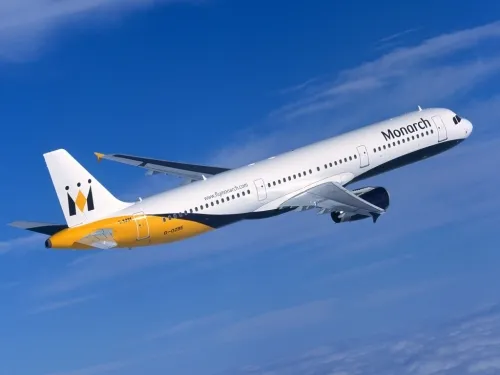
Monarch Airlines grounded after entering administration
Oct 02, 2017

Monarch Airlines, a prominent UK-based airline, ceased operations after entering administration in October 2017. The decision followed financial difficulties that left the company unable to sustain its services, impacting thousands of passengers who were stranded abroad. The UK Civil Aviation Authority intervened, launching a repatriation operation to bring affected travelers home. Monarch's collapse marked one of the largest airline failures in British history, leading to significant job losses and raising concerns about the health of the aviation industry. The airline's exit from the market highlighted the challenges faced by carriers in a competitive environment and the impact of rising operational costs.
In October 2017, Monarch Airlines, once one of the largest and most recognized airlines in the UK, was grounded after entering administration. This sudden cessation of operations left hundreds of thousands of travelers stranded and initiated one of the biggest repatriation efforts in UK history. The collapse of Monarch Airlines serves as a crucial case study for understanding the challenges facing the airline industry and the importance of financial stability.
Background of Monarch Airlines
Founded in 1967, Monarch Airlines operated as a low-cost carrier, offering holiday flights and charter services to various destinations across Europe and beyond. The airline was known for its affordable fares and a wide selection of routes, making it a popular choice among budget-conscious travelers. However, despite its long-standing presence in the market, Monarch faced increasing competition from other low-cost airlines and struggled to adapt to changing consumer demands.
Factors Leading to Administration
The decision to enter administration was influenced by several critical factors:
| Factor | Description |
|---|---|
| Financial Losses | Monarch Airlines reported consistent financial losses over several years, with debts accumulating significantly. |
| Increased Competition | The rise of other low-cost carriers, such as EasyJet and Ryanair, intensified competition, leading to fare wars that further eroded profit margins. |
| Changing Market Dynamics | Shifts in consumer behavior, including a preference for last-minute bookings and package deals, made it difficult for Monarch to maintain its traditional business model. |
| Operational Challenges | Ongoing operational issues, including flight delays and customer service complaints, contributed to a decline in customer trust and loyalty. |
The Impact of Monarch Airlines' Collapse
The collapse of Monarch Airlines had widespread repercussions for various stakeholders:
- Passengers: Thousands of travelers found themselves stranded abroad, necessitating a major repatriation effort led by the UK Civil Aviation Authority.
- Employees: Approximately 2,100 employees lost their jobs, leading to economic hardship and uncertainty for many families.
- Tourism Industry: The collapse impacted numerous hotels, tour operators, and other businesses reliant on Monarch's flight services.
Repatriation Efforts
The UK government initiated a substantial repatriation operation known as Operation Matterhorn, which aimed to bring back stranded passengers. The operation involved chartering additional flights from competing airlines and was hailed as one of the largest peacetime repatriations in British history.
Lessons Learned from Monarch Airlines' Downfall
The downfall of Monarch Airlines highlights several important lessons for the aviation industry:
- Financial Management: Airlines must maintain robust financial health to withstand market fluctuations and unforeseen challenges.
- Adaptability: The ability to adapt to changing consumer preferences and market dynamics is crucial for long-term sustainability.
- Customer Service: Investing in customer service and ensuring a positive passenger experience can significantly impact brand loyalty and reputation.
The Future of Air Travel in the UK
In the wake of Monarch Airlines' collapse, the UK airline industry has continued to evolve. New entrants have emerged, and existing carriers have adjusted their business models to remain competitive. The focus has shifted toward enhancing operational efficiency, improving customer experience, and leveraging technology to streamline processes.
Conclusion
The grounding of Monarch Airlines serves as a stark reminder of the challenges faced by airlines in a competitive market. The lessons learned from this event continue to resonate throughout the industry, emphasizing the importance of financial prudence, adaptability, and customer-centric strategies. As the landscape of air travel continues to change, stakeholders must remain vigilant and responsive to ensure the sustainability and growth of the industry.
For anyone involved in travel, whether as a consumer, an industry professional, or an investor, understanding the implications of Monarch Airlines' collapse is essential. It offers valuable insights into the intricacies of airline operations and the critical factors that contribute to success or failure in this dynamic sector.
Related Articles

Explore Thailand: The Best Islands to Visit for Paradise, Adventure, and Relaxation

The Ultimate Guide to the Best Islands in Thailand for Your Next Getaway

Do babies need passports? How to get a passport for a newborn

How to get a U.S. passport fast: here’s how to expedite the process

What is Mobile Passport Control: 5 reasons why you should use it

SENTRI vs. Global Entry: A detailed guide

Do you need a passport to go to the Bahamas? Let’s find out

Do you need a passport to go to Mexico? A detailed guide

Do you need a passport to go to Canada? We got the answer

Do You Need a Passport for a Cruise: An Essential Travel Guide

Booster Seat Requirements: All the Rules to Follow in Your Rental Car

What Are the World’s Most Powerful Passports, and How Does Yours Rank?

How to Take a Passport Photo at Home: A Helpful Guide

You've got to have heart! Southwest's new livery

Your opinion: Should water be free on low cost carriers?

Young women bolder than guys as solo travellers
